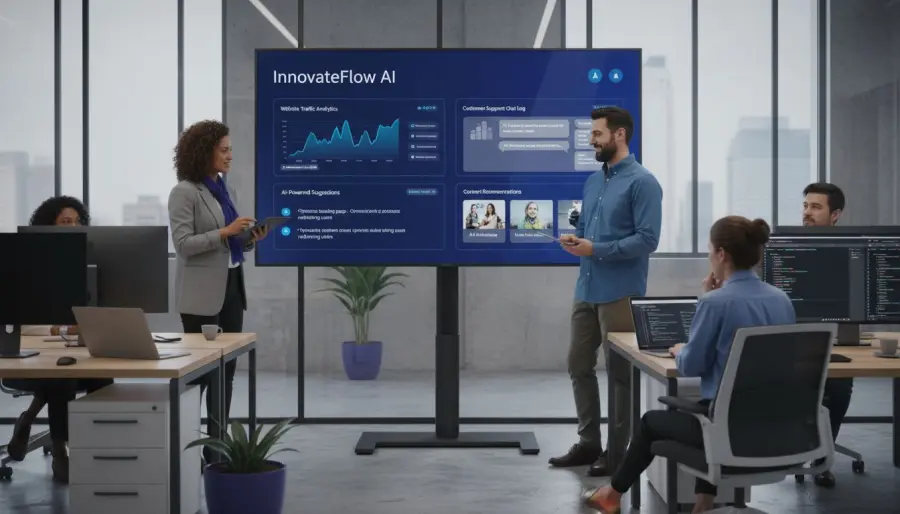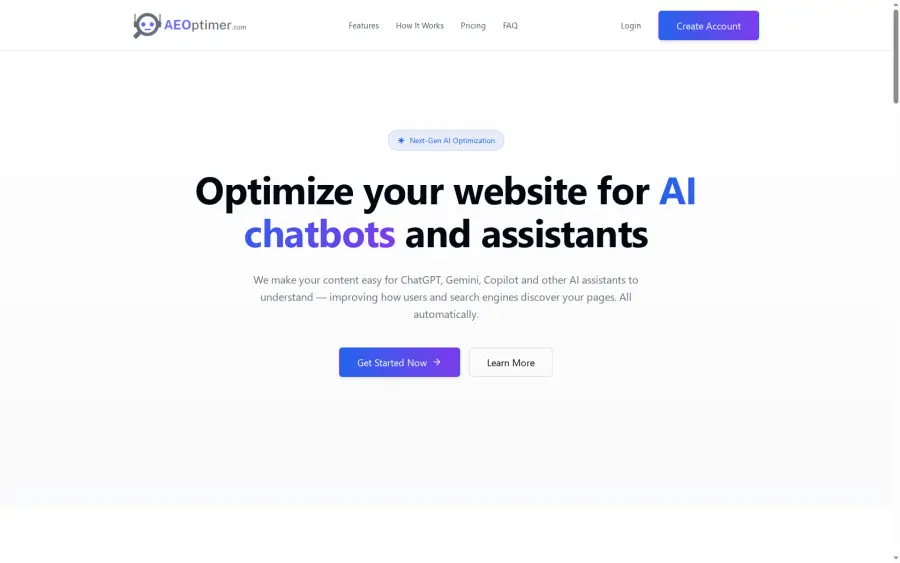Why AI Assistants Matter for Websites: Complete Guide

Over half of online shoppers now expect websites to offer real-time help tailored to their needs. Businesses are racing to keep up as artificial intelligence quickly changes the way people interact with digital platforms. Smart AI assistants are shaping the future, making websites more responsive and user-focused than ever before by delivering faster answers, better recommendations, and more meaningful engagement.
Table of Contents
- Defining AI Assistants And Website Integration
- Core Benefits For SEO And Discoverability
- AI Assistant Types And Their Website Roles
- How AI Assistants Influence Web Traffic
- Challenges, Limitations, And Avoiding Common Pitfalls
Key Takeaways
| Point | Details |
|---|---|
| AI Assistants Enhance User Interaction | AI assistants automate workflows and provide intelligent responses, fundamentally changing website user engagement. |
| AI-Driven SEO Optimization | Integrating AI assistants improves search visibility and user experience, offering personalized content recommendations and dynamic site adaptations. |
| Diversity of AI Assistant Types | Various types of AI assistants serve distinct roles, from customer support chatbots to recommendation engines, enhancing overall website functionality. |
| Navigating Challenges in Integration | Implementing AI assistants requires careful management of technical and ethical challenges, ensuring data privacy and effective AI performance while avoiding common pitfalls. |
Defining AI Assistants and Website Integration
AI assistants are sophisticated software applications powered by artificial intelligence that revolutionize how websites interact with users. According to Salesforce, these digital tools understand natural language, process complex commands, and perform specific tasks to assist users with unprecedented efficiency.
At their core, AI assistants transform website experiences by automating workflows and delivering intelligent, context-aware responses. They leverage advanced natural language processing to interpret user queries, understand intent, and generate precise, helpful answers. Research from an open-source web component study highlights the potential for creating next-generation information systems that can communicate knowledge across diverse domains.
Website integration of AI assistants typically involves implementing intelligent features that enhance user interaction. Key capabilities include:
- Real-time question answering
- Personalized user guidance
- Automated customer support
- Intelligent content recommendations
- Workflow automation
By strategically embedding AI assistants, websites can create more dynamic, responsive, and user-friendly digital experiences that adapt to individual user needs and preferences.
 The goal is not just automation, but creating intuitive, intelligent interactions that feel natural and seamless.
The goal is not just automation, but creating intuitive, intelligent interactions that feel natural and seamless.
Core Benefits for SEO and Discoverability
Agentic AI Optimization (AAIO) represents a groundbreaking approach to enhancing website visibility and performance in the AI-driven digital ecosystem. According to research from emerging AI integration studies, this methodology mirrors the transformative impact Search Engine Optimization (SEO) had on digital content discoverability, but specifically focuses on interactions between autonomous AI systems and online platforms.
Websites implementing AI assistants gain significant advantages in search visibility and user engagement. Adaptive websites dynamically adjust their content and structure based on user interaction patterns, creating a more intelligent and responsive digital experience. As defined by Wikipedia’s adaptive website research, these platforms automatically improve their organization by learning from user access patterns, which directly enhances discoverability and user retention.
The core benefits of AI-driven SEO optimization include:
- Enhanced content relevance and precision
- Faster indexing by AI search algorithms
- Improved natural language understanding
- More personalized user experiences
- Higher engagement and interaction rates
By strategically integrating AI assistants, websites can transform their digital presence from static information repositories to dynamic, intelligent platforms that anticipate and respond to user needs. The future of online discoverability lies not just in keyword optimization, but in creating truly intelligent, context-aware digital experiences that seamlessly connect users with the information they seek.
AI Assistant Types and Their Website Roles
AI Assistants represent a diverse ecosystem of digital tools designed to transform website interactions and user experiences. Research on Agentic AI reveals a sophisticated paradigm where AI systems demonstrate remarkable autonomy, capable of making independent decisions and proactively adapting strategies in real-time based on dynamic inputs and user feedback.
Websites can implement various AI assistant types, each serving unique functional roles. According to research on AI subdomains, these digital environments can be strategically isolated to provide specialized interactions without disrupting primary website traffic. This approach allows for targeted, efficient AI-driven functionalities that enhance overall user engagement.
The primary AI assistant types for websites include:
Here’s a comparison of key AI assistant types and their primary website roles:
| AI Assistant Type | Main Role | Example Capabilities |
|---|---|---|
| Conversational Chatbots | Customer support & user guidance | Answer FAQs Live chat Issue resolution |
| Recommendation Engines | Personalized content & product suggestions | Product upsell Related articles Custom offers |
| Interactive Search Assistants | Enhanced navigation | Smart search Voice queries Refined filtering |
| Transactional Agents | E-commerce & workflow automation | Process orders Book appointments Form completion |
| Adaptive Learning Assistants | Improving interaction models | User behavior analysis Content adaptation Personalized tips |
- Conversational Chatbots: Providing instant customer support and guidance
- Recommendation Engines: Personalizing content and product suggestions
- Interactive Search Assistants: Enhancing navigation and information retrieval
- Transactional Agents: Supporting e-commerce and complex user workflows
- Adaptive Learning Assistants: Continuously improving user interaction models
By strategically integrating these AI assistants, websites can create more intelligent, responsive, and user-centric digital experiences. The future of web interactions lies in developing nuanced, context-aware systems that understand and anticipate user needs, transforming passive websites into dynamic, intelligent platforms that actively engage and support their visitors.
How AI Assistants Influence Web Traffic
Web traffic dynamics are undergoing a profound transformation as AI assistants reshape how users discover, interact with, and navigate online content. Research on AI Subdomains highlights a critical shift from traditional website navigation toward more conversational and programmatic modes of online interaction, fundamentally changing how users engage with digital platforms.
The emergence of AI-driven agents has created new pathways for web traffic generation and user engagement. These intelligent systems go beyond simple search and navigation, offering contextual, personalized experiences that dynamically guide users through digital ecosystems. Unlike traditional web interfaces, AI assistants can interpret complex user intents, predict needs, and provide more nuanced, targeted information that increases overall website interaction and retention.
Key ways AI assistants influence web traffic include:
- Personalized content recommendation
- Enhanced search and discovery mechanisms
- Reduced bounce rates through intelligent guidance
- Improved user experience and engagement
- More intuitive navigation paths
As websites increasingly adopt AI-powered interfaces, the traditional linear model of web traffic is being replaced by more dynamic, intelligent interaction frameworks. These systems create multiple entry points, adapt in real-time to user behaviors, and transform passive browsing into active, conversational experiences that keep users more deeply connected and engaged with digital content.
Challenges, Limitations, and Avoiding Common Pitfalls
AI assistant integration comes with significant technical and ethical challenges that website owners must carefully navigate. Research on web interaction frameworks reveals that current approaches relying on repeated Large Language Model (LLM) HTML parsing are computationally expensive and prone to errors, especially when handling dynamic web interfaces and complex multi-step tasks.
Security and privacy represent critical concerns in AI assistant deployment. According to research on Agentic AI, many products integrating web capabilities have been criticized for potentially exfiltrating user information through non-standard communication protocols. This underscores the importance of implementing robust security measures and transparent data handling practices when incorporating AI assistants into websites.
Common pitfalls to avoid include:
- Overreliance on automated interactions
- Inadequate privacy protection mechanisms
- Poor natural language understanding
- Lack of clear user consent protocols
- Insufficient computational resource allocation
- Neglecting regular AI model updates
Successful AI assistant implementation requires a strategic approach that balances technological innovation with user trust, data privacy, and computational efficiency. Website owners must remain vigilant, continuously monitoring and refining their AI systems to ensure they provide genuine value without compromising user experience or security.
Unlock Smarter Website Visibility with AI Assistants and Automation
The article highlights the growing challenge websites face to stay visible and relevant in the fast-evolving AI-driven search landscape. If you are concerned about seamlessly integrating AI-friendly features like structured data and optimized content without disrupting your current site, then you understand the importance of keeping pace with AI assistants such as ChatGPT and Copilot. Common pain points like maintaining up-to-date content, ensuring AI discoverability, and automating optimization are crucial to overcoming waning traffic and missed engagement.
With aeoptimer.com, you can easily bridge this gap without needing technical skills. Our SaaS platform expertly enhances your website’s AI compatibility through ongoing automatic analysis, structured data enrichment, and monthly content refreshes that keep your pages highly discoverable by AI tools. Features like automatic sitemap detection and manual review options empower you to maintain control while boosting performance.
Ready to transform how AI assistants see your website and keep your traffic growing?

Discover how to future-proof your site for AI-powered search and engagement by visiting aeoptimer.com today. Start optimizing effortlessly and stay ahead with continuous AI-driven updates crafted to elevate your online presence.
Frequently Asked Questions
What are AI assistants and how do they enhance website interactions?
AI assistants are AI-powered applications that improve user interactions on websites by automating tasks, understanding natural language, and providing context-aware responses to user queries. They help automate workflows and deliver personalized guidance, significantly enhancing the user experience.
How can AI assistants improve website SEO and discoverability?
AI assistants boost website SEO through Agentic AI Optimization (AAIO), improving content relevance and precision, allowing for faster indexing by AI search algorithms, and offering personalized user experiences. This dynamic adaptability directly enhances discoverability and user engagement.
What are the different types of AI assistants that can be integrated into websites?
The main types of AI assistants for websites include conversational chatbots for customer support, recommendation engines for personalized content suggestions, interactive search assistants for enhanced navigation, transactional agents for e-commerce tasks, and adaptive learning assistants for refining user interactions based on behavior.
What challenges should website owners consider when integrating AI assistants?
Website owners should be aware of potential challenges such as privacy and security concerns, reliance on automated interactions, inadequate natural language understanding, and the need for regular updates to the AI models. It is essential to balance innovation with user trust and computational efficiency.





